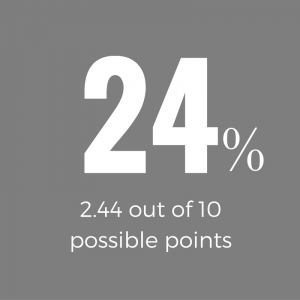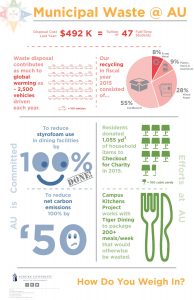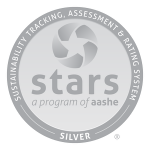At Auburn University the Waste Reduction & Recycling Departments leads our efforts to decrease waste by reducing resource use and increasing recycling. Minimizing and managing waste appropriately reduces environmental impacts, as well as promotes well-being and cuts waste costs on campus.
Waste
| Practices
SPOTLIGHTS
Profile
Profile
Joan Hicken – Waste Reduction and Recycling Coordinator at Auburn University, has found that traditionally people tend to recycle out of an inherent desire to do what is right. Joan says the Waste Reduction & Recycling Department encourages people to recycle by providing the necessary resources. Joan has found that the more convenient recycling options are the more people are likely to recycle.
Joan says an economic argument can be made for recycling, as well. According to a former professor of Joan’s, waste is a byproduct of inefficiency. Therefore, you’re throwing money away when you create waste. Joan said, “I try to make both an environmental plea and an economic argument. I hope that whoever is listening to me can take that in and decide for themselves what works for them.”
Project
Gameday Recycling has been an Auburn tradition since 2005. Student volunteers pass out clear bags to tailgaters to encourage the collection of their plastic bottles and aluminum cans. Facilities Management then picks up the bags Sunday after the game, so their contents can be recycled.
Points of Performance
Help us spread the facts on municipal waste at Auburn by downloading and sharing our poster, and then spend some time exploring the details about some of the people and projects that have helped create our success.
Auburn University is Tackling Stadium and Tailgate Waste
2016 REPORT CARD
The waste credits in AASHE STARS “seeks to recognize institutions that are moving toward zero waste by reducing, reusing, recycling, and composting.” These actions mitigate the need to extract virgin materials from the earth, and it takes less energy and water to make a product with recycled materials rather than virgin resources. Reducing waste also reduces the flow of waste to incinerators and landfills, which reduces greenhouse gas emissions. Using waste reduction processes on campus provides cost savings for the institution and benefits to the environment.
Below you can find out more about the specifics of Auburn’s performance in each of the credit areas, as well as how our efforts compare to those of other doctoral institutions who have also completed the STARS 2.0 assessment. *
OP-22: Waste Minimization 1.32/5.00
This credit recognizes institutions that are minimizing their production of waste. While other credits recognize the benefits of recycling and composting, this credit acknowledges the importance of preventative measures. Decreasing the total amount of materials that are used and discarded offers significant environmental benefits.
OP-23: Waste Diversion 0.37/3.00
This credit recognizes institutions that are diverting materials from landfills and incinerators and conserving resources by recycling and composting.
OP-24:Construction and Demolition Waste Diversion 0.00/1.00
This credit recognizes institutions that have diverted construction and demolition (C&D) wastes. Construction and demolition is a significant source of waste that falls outside of an institution’s standard waste stream and may be handled by a separate contractor or waste hauler.
OP-25:Hazardous Waste Management 0.75/1.00
This credit recognizes institutions that seek to minimize and safely dispose of all hazardous, universal, and non-regulated chemical waste and that have electronic waste (“e-waste”) recycling and/or reuse programs. Hazardous waste typically contains toxic components such as lead and mercury that can contaminate soil and groundwater and have detrimental human health impacts if handled improperly. At the same time, e-waste contains components that can be recycled. Likewise, computers, cellular phones, and other electronic materials can be donated or re-sold at reduced cost to non-profit organizations and community groups. Given the environmental and workplace health hazards that arise from hazardous waste disposal and e-waste recycling, this credit is reserved for programs that take steps to ensure that workers’ basic safety is protected and environmental standards are met.
Collectively these efforts place us squarely in the 1st quartile, when compared to other doctoral institutions that have completed the STARS 2.0 assessment.

* Language adapted from the official STARS 2.0 Technical Manual.
2016 PRACTICES IN PLACE
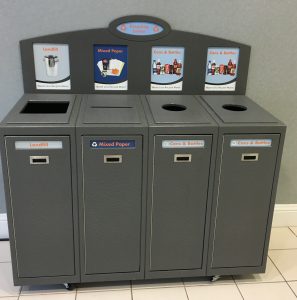
One of many bins used on campus to separate cans and bottles, mixed paper, and items going to the landfill.
At the time of the AASHE STARS submission, some of the sustainable waste management practices on campus included:
Campus Kitchens Project at Auburn University
Composting Pilot Program
Gameday Recycling
Hazardous Materials Management Program
Project Clean Plate
Trim Tracks
Weagle Water Bottle Refill Station
KEY PARTNERS AND PLANS
The waste successes of Auburn wouldn’t be possible without the foresight and determination of many units across campus and in the community. We hope you’ll choose to learn more about these important partners and the services and programs they offer the Auburn Family.
Auxiliary Services — Asset Management
Auxiliary Services — Tiger Dining
Risk Management and Safety — Environmental Health & Safety
Facilities Management — Construction Management
Facilities Management — Landscaping
Facilities Management — Waste Reduction and Recycling Department
GET INVOLVED
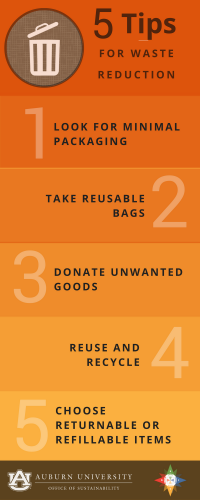 Choosing more sustainable options for your waste can serve as a great start to making a difference, but you can also help improve our world by joining with others to work on these challenges at a larger scale. Consider connecting with one of the following groups or academic units to meet others interested in working on these issues, too.
Choosing more sustainable options for your waste can serve as a great start to making a difference, but you can also help improve our world by joining with others to work on these challenges at a larger scale. Consider connecting with one of the following groups or academic units to meet others interested in working on these issues, too.
Organizations
Waste Reduction and Recycling — Gameday Recycling
Degree Options
2016 STARS Report Score
